Related Research Articles

Nicholas Vachel Lindsay was an American poet. He is considered a founder of modern singing poetry, as he referred to it, in which verses are meant to be sung or chanted.
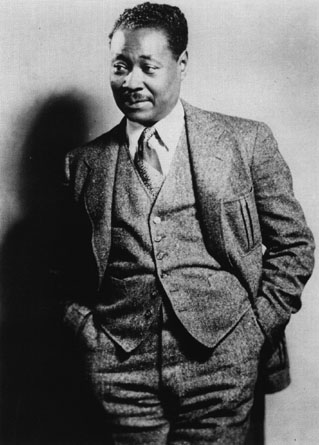
Festus Claudius "Claude" McKay OJ was a Jamaican-American writer and poet. He was a central figure in the Harlem Renaissance.

Spoken word is an oral poetic performance art that is based mainly on the poem as well as the performer's aesthetic qualities. It is a 20th-century continuation of an ancient oral artistic tradition that focuses on the aesthetics of recitation and word play, such as the performer's live intonation and voice inflection. Spoken word is a "catchall" term that includes any kind of poetry recited aloud, including poetry readings, poetry slams, jazz poetry, pianologues, musical readings, and hip hop music, and can include comedy routines and prose monologues. Unlike written poetry, the poetic text takes its quality less from the visual aesthetics on a page, but depends more on phonaesthetics, or the aesthetics of sound.

Sterling Allen Brown was an American professor, folklorist, poet, and literary critic. He chiefly studied black culture of the Southern United States and was a professor at Howard University for most of his career. Brown was the first Poet Laureate of the District of Columbia.
Sydney Goodsir Smith was a New Zealand-born Scottish poet, artist, dramatist and novelist. He wrote poetry in literary Scots, sometimes referred to as Lallans, and was a major figure of the Scottish Renaissance.
Edward Kamau Brathwaite, CHB, was a Barbadian poet and academic, widely considered one of the major voices in the Caribbean literary canon. Formerly a professor of Comparative Literature at New York University, Brathwaite was the 2006 International Winner of the Griffin Poetry Prize, for his volume of poetry Born to Slow Horses.

Shirley Graham Du Bois was an American-Ghanaian writer, playwright, composer, and activist for African-American causes, among others. She won the Messner and the Anisfield-Wolf prizes for her works.
Jayne Cortez was an African-American poet, activist, small press publisher and spoken-word performance artist. Her writing is part of the canon of the Black Arts Movement. She was married to jazz saxophonist Ornette Coleman from 1954 to 1964, and their son is jazz drummer Denardo Coleman. In 1975, Cortez married painter, sculptor, and printmaker Melvin Edwards, and they lived in Dakar, Senegal, and New York City.
Oral poetry is a form of poetry that is composed and transmitted without the aid of writing. The complex relationships between written and spoken literature in some societies can make this definition hard to maintain.

Efua Theodora Sutherland was a Ghanaian playwright, director, dramatist, children's author, poet, educationalist, researcher, child advocate, and cultural activist. Her works include the plays Foriwa (1962), Edufa (1967), and The Marriage of Anansewa (1975). She founded the Ghana Drama Studio, the Ghana Society of Writers, the Ghana Experimental Theatre, and a community project called the Kodzidan. As Ghana's earliest playwright-director, she was an influential figure in the development of modern Ghanaian theatre, and helped to introduce the study of African performance traditions at university level. She was also a pioneering African publisher, establishing the company Afram Publications in Accra in the 1970s.
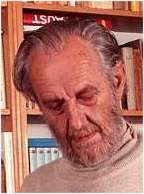
Peter Rudolf Gisela Horn was a Czech-born South African poet. He made his mark especially with his anti-Apartheid poetry. At the end of World War II he had to flee from his home and settled with his parents first in Bavaria and later in Freiburg im Breisgau, where he completed high school in 1954. He then emigrated with his parents to South Africa.
Kofi Anyidoho is a Ghanaian poet and academic who comes from a family tradition of Ewe poets and oral artists. He is currently Professor of Literature at the University of Ghana.

Cane is a 1923 novel by noted Harlem Renaissance author Jean Toomer. The novel is structured as a series of vignettes revolving around the origins and experiences of African Americans in the United States. The vignettes alternate in structure between narrative prose, poetry, and play-like passages of dialogue. As a result, the novel has been classified as a composite novel or as a short story cycle. Though some characters and situations recur between vignettes, the vignettes are mostly freestanding, tied to the other vignettes thematically and contextually more than through specific plot details.
Abu Ishaq ibn Ibrahim ibn Abu al-Fath (1058–1138/9), called Ibn Khafajah, a native of Alzira, was a poet of al-Andalus during the reign of the Almoravids. He was born in 1058 in Alzira near Valencia where he spent most of his life. He was the maternal uncle of poet Ibn al-Zaqqaq.

"The Negro Speaks of Rivers" is a poem by American writer Langston Hughes. Hughes wrote the poem when he was 17 and crossing the Mississippi River on the way to visit his father in Mexico. It was first published the following year in The Crisis, starting Hughes's literary career. "The Negro Speaks of Rivers" uses rivers as a metaphor for Hughes's life and the broader African-American experience. It has been reprinted often and is considered one of Hughes's most famous and signature works.
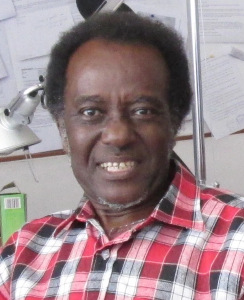
B. Kojo Laing or Bernard Kojo Laing was a Ghanaian novelist and poet, whose writing is characterised by its hybridity, whereby he uses Ghanaian Pidgin English and vernacular languages alongside standard English. His first two novels in particular – Search Sweet Country (1986) and Woman of the Aeroplanes (1988) – were praised for their linguistic originality, both books including glossaries that feature the author's neologisms as well as Ghanaian words.
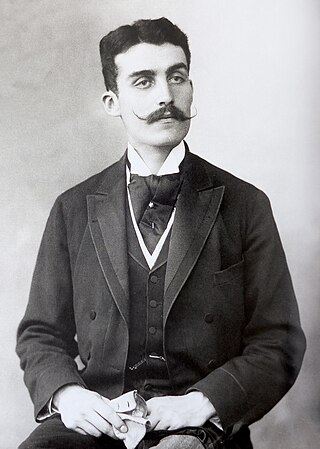
Aymeric Eugène Robert d’Humières was a French man of letters, poet, chronicler, translator and theatre director.
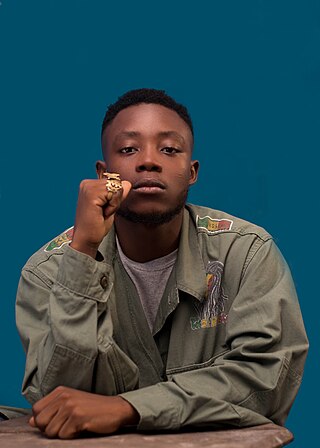
William Du Bois Yaw Sakyi Kumi, popularly known as Koo Kumi, is a Ghanaian spoken word artist, photographer, slam poet and mixed media visual artist. He is known for his blend of Twi and English languages. He adopts a traditional sound as well as an alternative hip hop feel. He appeared on the literary scene in 2012.
"Harlem" is a poem by Langston Hughes. These eleven lines ask, "What happens to a dream deferred?", providing reference to the African-American experience. It was published as part of a longer volume-length poem suite in 1951 called Montage of a Dream Deferred, but is often excerpted from the larger work. The play A Raisin in the Sun was titled after a line in the poem.
References
- 1 2 Oyekan Owomoyela (2008). The Columbia Guide to West African Literature in English Since 1945. Columbia University Press. p. 57. ISBN 978-0-231-51215-2.
- ↑ Hein Willemse, 'An Interview with Kobena Eyi Acquah', English in Africa, Vol. 14, No. 2 (October 1987)
- 1 2 Kofi Anyidoho (1992). "Poetry as Dramatic Performance: The Ghana Experience". In Gordon Collier (ed.). Us/them: Translation, Transcription and Identity in Post-colonial Literary Cultures. Rodopi. pp. 267–9. ISBN 90-5183-394-6.
- 1 2 Pietro Deandrea (2002). Fertile Crossings: Metamorphoses of Genre in Anglophone West African Literature. Rodopi. pp. 152–62. ISBN 90-420-1468-7.